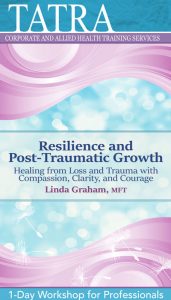28 Apr Resilience and Post-Traumatic Growth: Healing from Loss and Trauma with Compassion, Clarity, and Courage
Course Content

People do learn and grow from meeting the challenges and adversities of life when they have the support, resources, and skills to do so.
Helping clients strengthen their capacities – innate in their brains – to cope with any level of adversity – from a series of small annoyances to the troubles and tragedies that break their hearts to the utter catastrophes that change their lives forever – is at the heart of the therapeutic process.
This training teaches clinicians the basics of harness the brain’s neuroplasticity to help clients learn more flexible and adaptive coping strategies and rewire negative coping patterns that block their recovery, learning and growth.
Clients learn the techniques that reverse the impacts of stress and trauma, shift the functioning of the brain out of reactivity, contraction, dissociation into more receptivity and openness to learning, help clients once again trust other people as refuges and resources, discern new options, and deepen the meaning and purpose in their lives. The direct measurable outcome is resilience.
Program Outline
What Resilience Is
-
- Emerging definitions from behavioural sciences, modern neuroscience, the field of post-traumatic growth. Example from American Psychological Association:
- Resilience is the process of adapting well in the face of adversity, trauma, tragedy, threats or significant sources of stress.
How Resilience Is Developed…or Derailed
- Relevance of modern neuroscience: resilience is a capacity innate in human beings because it is innate in the human brain.
- Impact of attachment conditioning and trauma on the development of the brain and resilience…or not
Role of Neuroplasticity
- Because the brain learns and rewires itself from experience, teaching clients the experiential tools that will strengthen the structures of the brain that support flexible and adaptive coping strategies, and rewire negative coping patterns that block their learning and growth – in ways that are safe, efficient, and effective.
Somatic Intelligence
- Use body-based tools to help clients reverse the impact of stress and trauma on their nervous system, returning to an inner sense of safety and equilibrium, their natural range of resilience
Emotional Intelligence
- Help clients manage disruptive emotions, deepen self-compassion and empathy, and cultivate the positive emotions that antidote the brain’s negativity bias and shift brain functioning from contracted survival responses to openness to learning and growth
Relational Intelligence within One’s Self
- Cultivate the self-awareness and self-appreciation that help clients heal form toxic shame, retire the inner critic, and recover their inner well-being
Relational Intelligence with Others
- Teach the relational skills – reaching out for help, communicating without shame or blame, negotiating change, setting limits and boundaries, resolving conflict, repairing ruptures, and practicing forgiveness -that allow clients to trust other people as refuges and resources in difficult times
Reflective Intelligence
- Adapt practices of mindfulness to help clients identify dysfunctional patterns of coping and discern new choices of behaviour
Post-Traumatic Growth
- Help clients apply evidenced-based tools to the five factors that predict genuine post-traumatic growth:
- Acceptance of reality (and the consequences of what happened);
- Resourcing with family, friends, friends, and community
- Recognizing the positive in the midst of the difficult; finding the gifts in the mistakes
- Writing a coherent narrative of the event within the larger life story
- Appreciating the new opportunities and deeper meaning that emerges because of the difficulties, not just in spite of them.


At the end of the training, participants will be better able to:
- Describe the differences between stressors (external events) and stress (internal reactions to external events) and the differences between stress and trauma (an overwhelm of defenses against stress or external events)
- Apply techniques of memory deconsolidation-reconsolidation to help clients change how they perceive and respond to memories of past traumatic events.
- Utilize practices of self-compassion that help clients counter the harshness of the inner critic and inner toxic shame, deepen their self-acceptance of all inner parts and voices, and strengthen the inner secure base of resilience.
- Incorporate techniques to cultivate positive emotions that help clients antidote the brain’s negativity bias and shift the functioning of the brain from contraction and reactivity to responsiveness and openness to learning.
- Teach clients to use five body-based tools to regulate automatic survival responses and return the body-brain to its natural physiological equilibrium
- Teach clients three practices of guided visualization to create inner resources of resilience
- Identify 7 steps of mindfulness practice that allow clients to monitor and modify their responses to experience
- Use tools of written narrative and reflection to help clients find the silver lining or lessons to be learned from traumatizing events.
- Identify three common de-railers of resilience in therapeutic sessions
- Describe 5 factors essential to post-traumatic growth


Linda Graham, MFT, is a clinical psychologist with Master Degree in Marriage and Family Therapy. She’s an experienced psychotherapist and mindful self-compassion teacher in the San Francisco Bay Area, USA. Linda is the author of the award-winning Bouncing Back: Rewiring Your Brain for Maximum Resilience and Well-Being, and the new book, Resilience: Powerful Practices for Bouncing Back from Disappointment, Difficulty, and Even Disaster.
Since the publication of Bouncing Back, she has trained thousands of practitioners in clinical trainings and workshops, online courses and in meditation centrers through the United States and in Canada, Australia, Europe and the Middle East. Her workshops are always well attended and full of practical excercises.
Linda integrates modern neuroscience, mindfulness, and relational psychology in her national and international trainings. She regularly writes for national publications in the USA such as The Psychotherapy Networker, Mindful, Wise Brain Bulletin, and the Greater Good Science Center newsletters.

This online workshop will give you instant access to video content, accessible via streaming on our website, as well as downloads for supplemental materials. You can view the course content in your own time, there is no time limit on access.
A certificate of completion will be generated upon finishing the course and completing a short evaluation quiz. Please consult your professional organisation/association to confirm whether you are able to claim any CPD points/hours for this online workshop.



 CBT Boot Camp
CBT Boot Camp
